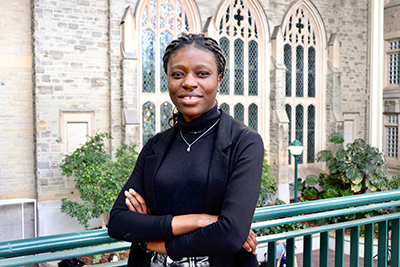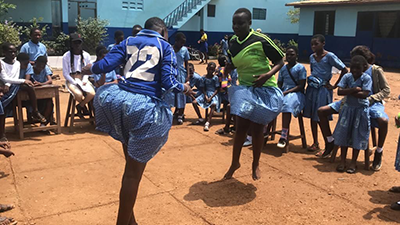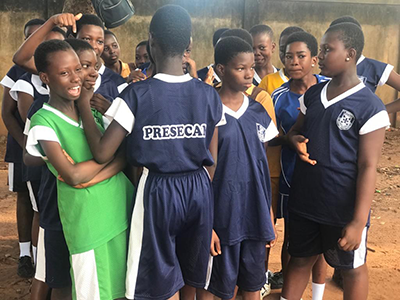International student aims to use traditional sports to create change in Ghana

As an undergraduate student at the University of Ghana, Ivy Osei was surprised to discover a passion for learning – and teaching others – about traditional folk games.
Now a graduate student in Western’s Sports Management program within the School of Kinesiology, she plans to use her current research in “The role of standardization in safeguarding traditional folk games” to grow SportDrive, a non-governmental organization (NGO) she co-founded in Ghana focused on developing traditional games into standardized sports.
“I had never played sports, so it was a bit strange for me to take a sports class, but I did for some reason. During my lecture on the first day the professor told us the course is not necessarily for athletes – it’s also for people who want to use sports as a tool for development,” said Osei, who completed a Bachelor of Arts in Sociology, Physical Education and Sport Studies at the University of Ghana in 2019.
“Sports are much more about social development than just the sports themselves and can be used to cause positive change in individuals and communities. That’s what I’m interested in doing.”
An assignment during a class in 2018 led to the founding of SportDrive with three of her classmates. The class was tasked with taking traditional Ghanaian games and describing them as if they were a sport that could be included in the Olympics.

“We thought, ‘Why don’t we try to make that happen? How can we create rules for these games because people love them in Ghana and just engage in them for fun? Why couldn’t we develop some of our Ghanaian traditional games into standardized sports that one day we might see in the Olympics?’”
The more she learned about the impact sports can have on communities, the more dedicated she became to bringing them to more people, especially rural constituents.
“People in rural communities don't have access to elite sports. Even if they do, it is expensive to invest in and they don't even have the infrastructure in the first place. So, they hardly participate in them – they just see people in urban communities participate more in diverse sports, and then they admire that,” she said.
“If we can standardize traditional folk games into a more attractive and competitive sport, it will give them opportunities to create heroes from among themselves, build social capital and further create awareness about the role of traditional folk games in national development. It further breaches the gap of access to elite sports since they gain exposure and a chance to further pursue traditional games or elite sports.”
Her desire to grow SportDrive led her to pursue her master’s degree to learn more about how to influence public policy and what it takes to institutionalize traditional folk games. While at Western, her co-founders and volunteers continue with their community and school outreach and demonstrations, and she stays in constant communication with them about progress.
“My colleagues are still working on a pilot to see if some of the ideas we put together are feasible. It may take a while to eradicate misconceptions surrounding the games because they have been neglected for long. However, we are optimistic we will get the buy-in from society. We intend to hold regular dialogues with leaders within the education system and introduce books on Ghanaian games,” she said.  “We’ve had a lot of support from professors on structuring the content of our book so that we could push for its inclusion in the school curriculum for students. Right now, no written documents or books on Ghanaian traditional folk games exists for scholarly reference or to teach students about this aspect of their cultural heritage.”
“We’ve had a lot of support from professors on structuring the content of our book so that we could push for its inclusion in the school curriculum for students. Right now, no written documents or books on Ghanaian traditional folk games exists for scholarly reference or to teach students about this aspect of their cultural heritage.”
A first-time visitor to Canada, Osei says despite the many differences between the cultures, she has felt welcomed by the Western community.
“My professors, especially, have been so helpful. One, in particular, invited me to watch an American football game, which was my first football experience. She was patient and explained the games to me which I have come to appreciate” she said. “I’m grateful for all their support and for the support of my supervisor, Laura Misener, who believed in me and gave me the opportunity to join her team. My classmates have also been very helpful and I think that’s what has really helped me to like it here.”
Following graduation, Osei is looking forward to being actively involved in SportDrive in Ghana and Sport for Development initiatives. While she’s in Canada, though, she plans to embrace every opportunity to learn and make connections.
“It’s hard to be so far away from my home and unable to be there with my colleagues and friends but I know that my being here and doing this research is for a greater good.”
Learn more about SportDrive:
instagram.com/sportdrive_inc
facebook.com/sport.drive
sportdrive178752425.wordpress.com
*Photos: pictured, top: Ivy Osei; middle and bottom (courtesy of Ivy Osei): Students in The Hartley Trust Foundation school (Nyanyano- Kakraba, Kasoa-Accra) demonstrating the modified way of playing "ampe"; students in Presec basic school (Legon, Accra) demonstrating the modified way of playing "ampe"

